Form CMS-10404 Individual Worker Survey
CMS National Balancing Indicators Project (NBIP) Direct Service Workforce (DSW) Data Collection Effort
CMS-10404 - Individual Worker Surveys and Materials 2-14-12 (2)
Individual Worker Survey
OMB: 0938-1160
CMS-10404;
OMB 0938-New
February 14, 2012
SPT Grantee Individual Worker Surveys and Accompanying Materials Table of Contents
Survey 1: Arkansas Independent Provider Survey Materials (divider page)
Post Card Front
IP Post Card Back
IP Cover Letter
IP Survey
Survey 2: Florida Independent Provider Survey Materials (divider page)
Post Card Front
IP Post Card Back
IP Cover Letter
IP Survey
Survey 3: Kentucky Independent Provider Survey Materials (divider page)
Post Card Front
IP Post Card Back
IP Cover Letter
IP Survey
Survey 4: Maine Independent Provider Survey Materials (divider page)
Post Card Front
IP Post Card Back
IP Cover Letter
IP Survey
Survey 5: Minnesota Independent Provider Survey Materials (divider page)
Post Card Front
IP Post Card Back
IP Cover Letter
IP Survey
Survey #1: Arkansas Independent Provider Survey
Arkansas Attendant Care Provider / Personal Assistant Survey
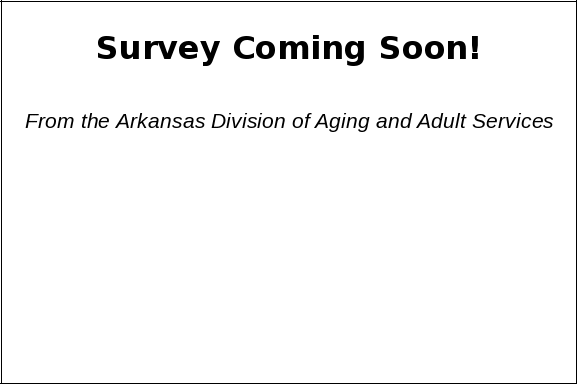
 §
§
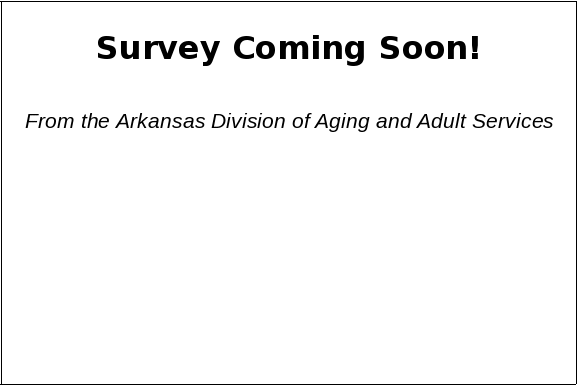

Arkansas Division of Aging and
Adult Services
P.O.
Box 1437
Slot
S530
Little
Rock, AR 72203
Recipient
Name Street
Address City,
State, Zip Code
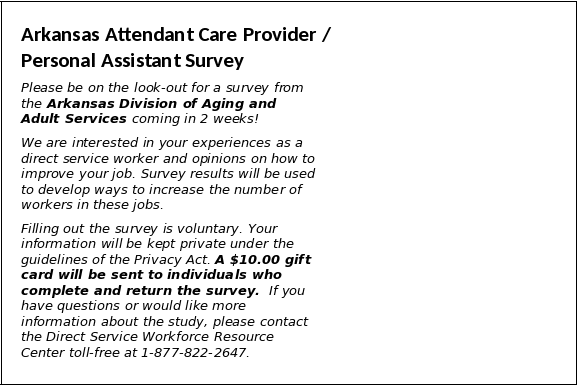



Arkansas Division of Aging and
Adult Services
P.O.
Box 1437
Slot
S530
Little
Rock, AR 72203
Recipient
Name Street
Address City,
State, Zip Code
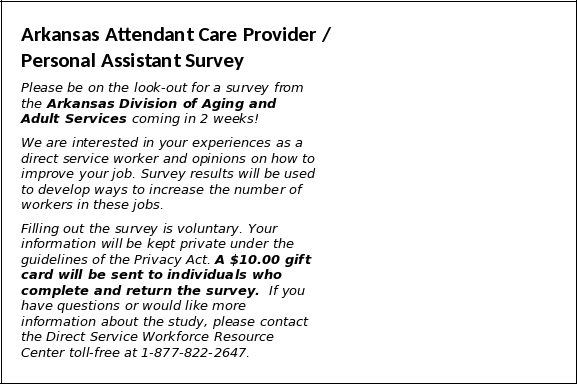

Arkansas Division of Aging and Adult Services
P.O. Box 1437
Slot S530
Little Rock, AR 72203
<<First Name>> <<Last Name>>
<<Recipient Title>>
<<Recipient Street Address>>
<<Recipient City>>, <<Recipient State>> <<Recipient Zip>>
<<Greeting Line>>
The Arkansas Division of Aging and Adult Services is in the process of collecting information on the experiences of Attendant Care Providers / Personal Assistants who are working or have worked, in the past 12 months, to support a person who is older or who has a disability. This effort is sponsored by the Centers for Medicare and Medicaid Services. You are being asked to complete this survey because your support/care enables or has enabled the person to live in his/her own home through the IndependentChoices program or Alternative for Adults with Physical Disabilities programs. This is an opportunity for you to voice your opinions. The survey is voluntary and will not affect your status as a provider.
We are very interested in obtaining your feedback about your experiences as an Attendant Care Provider or Personal Assistant and your opinions about possible ways to improve your job. The Arkansas Division of Aging and Adult Services will use information from this survey to develop ways to attract more workers into these jobs and keep workers in these jobs longer.
You can be assured that the information you give us on the survey will be kept private under the guidelines of the Privacy Act. To protect your privacy, staff who have access to your unique survey ID number will not have access to your responses. The number will be used only so we can follow-up with people who do not respond. Results will only be reported in summary form and you will not be identified. If you have questions while completing the survey or would like more information about the study, please contact the Direct Service Workforce Resource Center toll-free at 1-877-822-2647.
This survey should take only 10-15 minutes to complete. A $10.00 gift card will be sent to individuals who complete and return the survey. We appreciate your time and will use your feedback to identify ways to improve the experiences of the direct service workforce. Thank you in advance for completing this survey!
Sincerely,
<<Recipient Name>>
<<Current Title>>
Enclosure
Survey Instructions
Purpose of the Survey:
You are being asked to complete this survey because you are working or have worked, in the past 12 months, to support a person who is older or who has a disability. Your support/care enables the person to live in his/her own home through the IndependentChoices program or Alternative for Adults with Physical Disabilities program. A growing number of older people and people with disabilities in the U.S. need personal support or assistance in their own homes. However, there are not enough workers who provide this type of service. Seven states are participating in this survey project, sponsored by the Centers for Medicare and Medicaid Services. Information from this survey will help the state develop ways to attract more workers into these jobs and keep workers in these jobs longer.
Directions:
Please complete the survey and return in the self-addressed stamped envelope provided. Or if you have access to the Internet, you may fill out the survey through a secure website at: https://www.research.net/s/AR-ACP-Personal-Assistant-Survey
If you take the survey using the Internet, please enter <<123456>> when it asks for your Survey ID number. The survey will take approximately 10-15 minutes to complete.
Once you complete and return your survey you will receive a $10 gift card by mail.
Filling out this survey is voluntary. Your responses will be kept private under the guidelines of the Privacy Act. Your responses will not affect your status as an Attendant Care provider or Personal Assistant in Arkansas or the services the person(s) you support receives. Information will be kept private under the guidelines of the Privacy Act. This survey has been assigned Survey ID number that appears on the bottom of every page. This number will be linked to your name and contact information only so that we can send you a $10 gift card when you return the completed survey. Your name and all other identifying information will be kept separate from your survey responses.
For More Information:
If you have questions about the purpose of the survey or how to respond, please contact the Direct Service Workforce Resource Center toll-free at 1-877-822-2647.
Survey Questions
In the questions below, an “attendant care provider” or “personal assistant” is a person, like you, who is employed directly by a person who is older or has disabilities. You are employed by this person to provide paid services, care, and supports in his or her own home.
Do you currently work as an attendant care provider or personal assistant?
Yes, I have worked as an attendant care provider or personal assistant in the last 30 days. PLEASE CONTINUE AND COMPLETE THE REST OF THE SURVEY.
No, I have not worked an attendant care provider or personal assistant in the last 30 days. PLEASE STOP HERE AND RETURN THE SURVEY FOR YOUR GIFT CARD.
How long have you worked as an attendant care provider or personal assistant? Count your time at all jobs you have had doing this work. (provide number of full years and months)
______Years _____ Months
Do you work as an attendant care provider or personal assistant for a… (check all that apply)
Family member
Friend, neighbor, or someone else whom you know
Someone you didn’t know before
What is the reason(s) the person(s) you work for needs assistance? (check all that apply)
Physical disability
Intellectual or developmental disability
Older people with a need for support, assistance, or supervision due to chronic illness or disability, people with cognitive impairment
Mental health, addiction, or behavioral health
Traumatic brain injury
Other (specify)
I don’t know
Why did you decide to start providing services and supports as an attendant care provider or personal assistant? (check all that apply)
A friend or family member needed care
It gives me personal satisfaction
I can work a flexible schedule
This is the only job I could find
It is a good entry level job compared to other health care or human service related jobs
I need the income this job provides
Other___________________________
How many hours were you paid to work as an attendant care provider or personal assistant during the last week?
0 hours
1-8 hours
9-16 hours
17-24 hours
25-31 hours
32-40 hours
More than 40 hours
How many people did you work for as an attendant care provider or personal assistant during the last week? This information is needed to better understand the size of this workforce in the state.
Zero
One
Two
Three to five
More than five
How likely is it that you will still be working as an attendant care provider or personal assistant—either for the person(s) you currently support or for someone else—a year from now? Your response will not affect your status as an independent provider in Arkansas or the services the person(s) you support receives.
Very likely
Somewhat likely
Not likely at all
Don’t know
For each topic listed below, please check the boxes if you have received training on the topic in a class or training program (check all that apply).
-
Yes, I have received training program on this topic in a class or training program.
Advocacy

Assessing needs of person receiving support

Behavior management

Building and maintaining friendships and relationships

Communication

Confidentiality of person receiving support

Conflict resolution

Empowerment of person receiving support

Rights of person receiving support

Crisis prevention and intervention

Cultural competence1

Direct service professionalism

Documentation

Ethics

Facilitation of services (e.g., finding and getting services for the individual)

Health and wellness

Household management

Infection control

Interpersonal relationship skills

Nutritional support

Organizational participation

Participant-directed service planning and implementation

Personal care

Problem solving

Providing services based on needs of individual

Safety and emergency training

Stress management/personal safety and wellness

Teamwork

Vocational, educational, and career support

For each topic listed below, please check the boxes if you have received training on the topic from the person you support or their family (check all that apply).
-
Yes, I have received training on this topic from the person I support or their family.
Advocacy

Assessing needs of person receiving support

Behavior management

Building and maintaining friendships and relationships

Communication

Confidentiality of person receiving support

Conflict resolution

Empowerment of person receiving support

Rights of person receiving support

Crisis prevention and intervention

Cultural competence1

Direct service professionalism

Documentation

Ethics

Facilitation of services (e.g., finding and getting services for the individual)

Health and wellness

Household management

Infection control

Interpersonal relationship skills

Nutritional support

Organizational participation

Participant-directed service planning and implementation

Personal care

Problem solving

Providing services based on needs of individual

Safety and emergency training

Stress management/personal safety and wellness

Teamwork

Vocational, educational, and career support

For each topic listed below, please check the boxes if you need training on the topic (check all that apply).
-
Yes, I need training on this topic.
Advocacy

Assessing needs of person receiving support

Behavior management

Building and maintaining friendships and relationships

Communication

Confidentiality of person receiving support

Conflict resolution

Empowerment of person receiving support

Rights of person receiving support

Crisis prevention and intervention

Cultural competence1

Direct service professionalism

Documentation

Ethics

Facilitation of services (e.g., finding and getting services for the individual)

Health and wellness

Household management

Infection control

Interpersonal relationship skills

Nutritional support

Organizational participation

Participant-directed service planning and implementation

Personal care

Problem solving

Providing services based on needs of individual

Safety and emergency training

Stress management/personal safety and wellness

Teamwork

Vocational, educational, and career support

For each topic listed below, please check the boxes if you think training should be required for attendant care providers/PAs on this topic (check all that apply).
-
Yes, I think training should be required for attendant care providers/PAs on this topic.
Advocacy

Assessing needs of person receiving support

Behavior management

Building and maintaining friendships and relationships

Communication

Confidentiality of person receiving support

Conflict resolution

Empowerment of person receiving support

Rights of person receiving support

Crisis prevention and intervention

Cultural competence1

Direct service professionalism

Documentation

Ethics

Facilitation of services (e.g., finding and getting services for the individual)

Health and wellness

Household management

Infection control

Interpersonal relationship skills

Nutritional support

Organizational participation

Participant-directed service planning and implementation

Personal care

Problem solving

Providing services based on needs of individual

Safety and emergency training

Stress management/personal safety and wellness

Teamwork

Vocational, educational, and career support

Do you receive any of the following benefits as a part of your job as an attendant care provider or personal assistant? (check yes, no, or I don’t know for each type of benefit)
Health insurance
Yes
No
I don’t know
Paid vacation time
Yes
No
I don’t know
Paid sick leave time
Yes
No
I don’t know
Paid time off (PTO) (paid days off that can be used for either vacation or sick leave)
Yes
No
I don’t know
Transportation reimbursement
Yes
No
I don’t know
Workers’ compensation
Yes
No
I don’t know
Unemployment benefits
Yes
No
I don’t know
 Other,
please specify
Other,
please specify Who pays for your bills when you go to a doctor or hospital? (check all that apply)
My health insurance (includes Medicare or Medicaid) pays some or all
My spouse or family member’s insurance pays some or all
I pay some or all myself or someone else pays some or all for me (I do not have health insurance)
Other (please describe)
I don’t go to the doctor
I don’t know
If you do not have health insurance through your job as an attendant care provider or personal assistant, where do you get it from? (check all that apply)
I do not have health insurance
Another job
Spouse or partner
Medicaid
Medicare
Private plan/I buy my own health insurance
Pension/Retirement plan
Other (please describe)
If you support more than one person, please answer Questions 16 – 21 about the one person for whom you have worked the highest number of hours for as an attendant care provider or personal assistant in the last 30 days.
How many hours did you work for this one person in the last week?
0 hours
1-8 hours
9-16 hours
17-24 hours
25-31 hours
32-40 hours
More than 40 hours
How long have you worked for this one person?
Less than 1 month
1-6 months
6 months—1 year
1-2 years
2-3 years
3-5 years
Over 5 years
How much are you paid per hour to work for this person?
$____.____ per hour
Additional Comments: ________________________________________________
How old is this person? Your response is important to understanding the number of workers available to support people served by different state programs.
Birth to 17 years
18 to 21 years
22 to 64
65 or older
What type of services do you provide to this person? (check all that apply)
Assistance with activities of daily living such as bathing, dressing, feeding, transferring, and mobility
Assistance with instrumental activities of daily living such as cleaning, housekeeping, preparing meals, shopping, and managing money
Assistance with communication and self-direction (for example, providing training on communication skills, coaching and advocacy to support self-direction)
Assistance in the work place, vocational, or educational activities
Assistance with social and recreational activities and community involvement
Assistance with social, emotional, or behavioral needs (for example, providing coaching on building relationships and friendships, implementing a behavior management program)
Assistance with medication or health care
Assistance with transportation
Do you live with this person? Your response will help with planning to recruit more attendant care providers and personal assistants.
Yes
No
About You
What is your gender?
Male
Female
Which best describes your ethnicity?
Hispanic or Latino
Not Hispanic or Latino
Which best describes your race? (select one or more)
White
Black or African-American
American Indian or Alaskan Native
Asian
Native Hawaiian or other Pacific Islander
Thank you for completing this survey.
For paper surveys: Please return your completed survey to the address below in the postage paid envelope provided.
UALR Survey Research Center
Institute of Government
University of Arkansas at Little Rock
Ross Hall 404
2801 S. University Ave.
Little Rock, AR 72204-1099
PRA Disclosure Statement
According to the Paperwork Reduction Act of 1995, no persons are required to respond to a collection of information unless it displays a valid OMB control number. The valid OMB control number for this information collection is 0938-NEW. The time required to complete this information collection is estimated to average 20 min per response, including the time to review instructions, search existing data resources, gather the data needed, and complete and review the information collection. If you have comments concerning the accuracy of the time estimate(s) or suggestions for improving this form, please write to: CMS, 7500 Security Boulevard, Attn: PRA Reports Clearance Officer, Mail Stop C4-26-05, Baltimore, Maryland 21244-1850.
Survey #2: Florida Independent Provider Survey Materials
Florida Care Provider Survey




Centers
for Medicare and Medicaid Services
7500
Security Boulevard
Baltimore,
MD 21244
Recipient
Name Street
Address City,
State, Zip Code
Centers
for Medicare and Medicaid Services
7500
Security Boulevard
Baltimore,
MD 21244
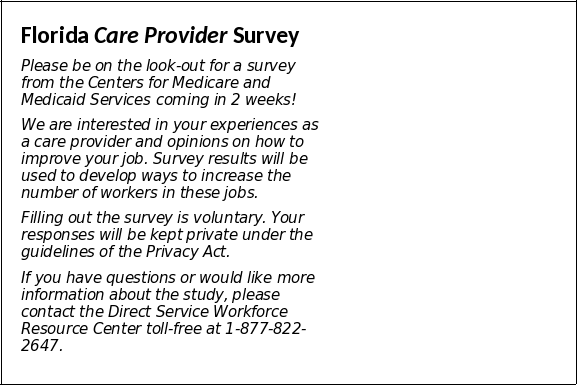



Recipient
Name Street
Address City,
State, Zip Code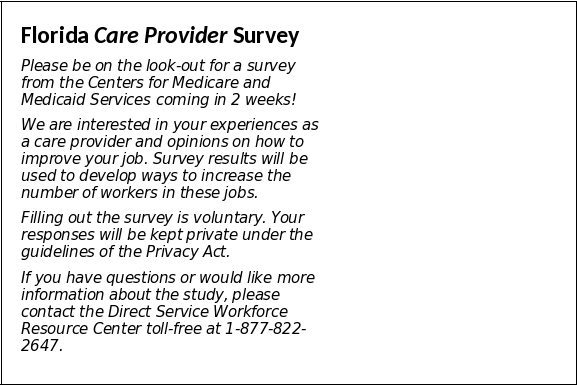

Centers for Medicare and Medicaid Services
7500 Security Boulevard
Baltimore, MD 21244
<<First Name>> <<Last Name>>
<<Recipient Title>>
<<Recipient Street Address>>
<<Recipient City>>, <<Recipient State>> <<Recipient Zip>>
<<Greeting Line>>
The Centers for Medicare and Medicaid Services is working with the Florida Department of Elder Affairs and the Agency for Persons with Disabilities to collect information on the experiences of Florida Care Providers - individuals who are working or have worked, in the past 12 months, to support a person who is older or who has a disability. You are being asked to complete this survey because your support/care enables or has enabled the person to live in his/her own home through the CDC+ program. This is an opportunity for you to voice your opinions. The survey is voluntary and will not affect your status as a provider.
We are very interested in obtaining your feedback about your experiences as a care provider and your opinions about possible ways to improve your job. The Centers for Medicare and Medicaid Services will use information from this survey to develop ways to attract more workers into these jobs and keep workers in these jobs longer.
You can be assured that the information you give us on the survey will be kept private under the guidelines of the Privacy Act. To protect your privacy, staff who have access to your unique survey ID will not have access to your responses. The number will be used only so we can follow-up with people who do not respond. Results will only be reported in summary form and you will not be identified. If you have questions while completing the survey or would like more information about the study, please contact the Direct Service Workforce Resource Center toll-free at 1-877-822-2647.
This survey should take only 10-15 minutes to complete. We appreciate your time and will use your feedback to identify ways to improve the experiences of the direct service workforce. Thank you in advance for completing this survey!
Sincerely,
<<Sender Name>>
<<Current Title>>
Enclosure
Survey Instructions
Purpose of the Survey:
You are being asked to complete this survey because you are working or have worked, in the past 12 months, to support a person who is older or has a disability. Your support/care enables the person to live in his/her own home through the CDC+ program. Florida is one of seven states participating in this survey project, sponsored by the Centers for Medicare and Medicaid Services. The Florida Department of Elder Affairs and the Agency for Persons with Disabilities are working in partnership with the Centers for Medicare and Medicaid Services and the National Direct Service Workforce Resource Center to conduct this survey. Florida plans to use this survey to understand more about the people who work in the CDC+ program. Information from this survey will help the state develop ways to attract more workers into these jobs and keep workers in these jobs longer.
Directions:
Please complete the survey and return in the self-addressed stamped envelope provided. Or if you have access to the Internet, you may fill the survey out through a secure website at: https://www.research.net/s/Florida-Care-Provider.
If you take the survey using the Internet, enter <<123456>> when it asks for your Survey ID number. The survey will take approximately 10-15 minutes to complete.
Filling out this survey is voluntary and your information will be kept private under the guidelines of the Privacy Act. Your responses will not affect your status as a CDC+ provider in Florida or the services the person(s) you support receives. Information will be kept private under the guidelines of the Privacy Act. This survey has been assigned a Survey ID number that appears on the bottom of every page. This number is the only way that you will be identified. Your name will be kept separate from your survey responses. You will not be identified in any way in any written report or presentation about this survey effort.
For More Information:
If
you have questions about the purpose of the survey or how to respond,
please contact
the Direct Service Workforce Resource Center
at 1-877-822-2647.
Survey Questions
In the questions below, “care provider” is a person, like you, who provides hands on supports and services for a person who is older or has disabilities. Care providers, like you, are employed by an older person or person with disabilities to provide paid services, care, and supports in his or her own home.
Do you currently work as a care provider?
Yes, I have worked as a Care Provider in the last 30 days. PLEASE CONTINUE AND COMPLETE THE REST OF THE SURVEY.
No, I have not worked as a Care Provider in the last 30 days. PLEASE STOP HERE. YOU DO NOT NEED TO COMLPETE THE REST OF THE SURVEY. THANK YOU FOR YOUR TIME AND ATTENTION.
How long have you worked as a Care Provider? Count your time at all jobs you have had doing this work. (provide number of full years and months)
______Years _____ Months
Do you work as a care provider for a… (check all that apply)
Family member
Friend, neighbor, or someone else who you know
Someone you didn’t know before
Please list the county(ies) in Florida in which you work as a Care Provider.
_________________________________________________________________________
What is the reason(s) the person(s) you work for needs assistance? (check all that apply)
Physical disability
Intellectual or developmental disability
Older people with a need for support, assistance, or supervision due to chronic illness or disability, people with cognitive impairment
Mental health, addiction, or behavioral health
Traumatic brain injury
Other (specify)
I don’t know
Why did you decide to start working as a Care Provider? (check all that apply)
A friend or family member needed care
It gives me personal satisfaction
I can work a flexible schedule
This is the only job I can find
It is a good entry level job compared to other health care or human service related jobs
I need the income this job provides
Other___________________________
How many hours were you paid to work as a Care Provider during the last week?
0 hours
1-8 hours
9-16 hours
17-24 hours
25-31 hours
32-40 hours
More than 40 hours
How many hours did you spend doing another type of paid work during the last week?
0 hours
1-8 hours
9-16 hours
17-24 hours
25-31 hours
32-40 hours
More than 40 hours
How many people did you work for as a Care Provider during the last week? This information is needed to better understand the size of this workforce in the state.
Zero
One
Two
Three to five
More than five
How likely is it that you will still be working as a Care Provider—either for the person(s) you currently support or for someone else—a year from now? Your response will not affect your status as Care Provider in Florida or the services the person(s) you support receives.
Very likely
Somewhat likely
Not likely at all
I don’t know
For each topic listed below, please check the boxes if you have received training on the topic in a class or training program (check all that apply).
-
Yes, I have received training program on this topic in a class or training program.
Advocacy

Assessing needs of person receiving support

Behavior management

Building and maintaining friendships and relationships

Communication

Confidentiality of person receiving support

Conflict resolution

Empowerment of person receiving support

Rights of person receiving support

Crisis prevention and intervention

Cultural competence1

Direct service professionalism

Documentation

Ethics

Facilitation of services (e.g., finding and getting services for the individual)

Health and wellness

Household management

Infection control

Interpersonal relationship skills

Nutritional support

Organizational participation

Participant-directed service planning and implementation

Personal care

Problem solving

Providing services based on needs of individual

Safety and emergency training

Stress management/personal safety and wellness

Teamwork

Vocational, educational, and career support

For each topic listed below, please check the boxes if you have received training on the topic from the person you support or their family (check all that apply).
-
Yes, I have received training on this topic from the person I support or their family.
Advocacy

Assessing needs of person receiving support

Behavior management

Building and maintaining friendships and relationships

Communication

Confidentiality of person receiving support

Conflict resolution

Empowerment of person receiving support

Rights of person receiving support

Crisis prevention and intervention

Cultural competence1

Direct service professionalism

Documentation

Ethics

Facilitation of services (e.g., finding and getting services for the individual)

Health and wellness

Household management

Infection control

Interpersonal relationship skills

Nutritional support

Organizational participation

Participant-directed service planning and implementation

Personal care

Problem solving

Providing services based on needs of individual

Safety and emergency training

Stress management/personal safety and wellness

Teamwork

Vocational, educational, and career support

For each topic listed below, please check the boxes if you need training on the topic (check all that apply).
-
Yes, I need training on this topic.
Advocacy

Assessing needs of person receiving support

Behavior management

Building and maintaining friendships and relationships

Communication

Confidentiality of person receiving support

Conflict resolution

Empowerment of person receiving support

Rights of person receiving support

Crisis prevention and intervention

Cultural competence1

Direct service professionalism

Documentation

Ethics

Facilitation of services (e.g., finding and getting services for the individual)

Health and wellness

Household management

Infection control

Interpersonal relationship skills

Nutritional support

Organizational participation

Participant-directed service planning and implementation

Personal care

Problem solving

Providing services based on needs of individual

Safety and emergency training

Stress management/personal safety and wellness

Teamwork

Vocational, educational, and career support

For each topic listed below, please check the boxes if you think training should be required for Care Providers on the topic (check all that apply).
-
Yes, I think training should be required for Care Providers on this topic.
Advocacy

Assessing needs of person receiving support

Behavior management

Building and maintaining friendships and relationships

Communication

Confidentiality of person receiving support

Conflict resolution

Empowerment of person receiving support

Rights of person receiving support

Crisis prevention and intervention

Cultural competence1

Direct service professionalism

Documentation

Ethics

Facilitation of services (e.g., finding and getting services for the individual)

Health and wellness

Household management

Infection control

Interpersonal relationship skills

Nutritional support

Organizational participation

Participant-directed service planning and implementation

Personal care

Problem solving

Providing services based on needs of individual

Safety and emergency training

Stress management/personal safety and wellness

Teamwork

Vocational, educational, and career support

Do you receive any of the following benefits as a part of your job as a Care Provider? (check yes, no, or I don’t know for each type of benefit)
Health insurance:
Yes
No
Idon’t know
Transportation reimbursement
Yes
No
I don’t know
Workers’ compensation
Yes
No
I don’t know
Unemployment benefits
Yes
No
I don’t know
 Other,
please specify
Other,
please specify
Who pays for your bills when you go to a doctor or hospital? (check all that apply)
My health insurance pays some or all (including Medicare or Medicaid)
My spouse or family member’s insurance pays some or all
I pay some or all myself or someone else pays some or all for me (I do not have health insurance)
Other (please describe)
I don’t go to the doctor
I don’t know
If you support more than one person, please answer Questions 17-20 about the one person who you have worked the highest number of hours for as a care provider in the last 30 days.
How many hours did you work for this one person in the last week?
0 hours
1-8 hours
9-16 hours
17-24 hours
25-31 hours
32-40 hours
More than 40 hours
How long have you worked for this one person?
Less than 1 month
1-6 month
6 months—1 year
1-2 years
2-3 years
3-5 years
Over 5 years
What is the highest amount per hour that you are paid to work for this person?
$____.____ per hour
Additional Comments: ________________________________________________
What is the lowest amount per hour that you are paid to work for this person?
$____.____ per hour
Additional Comments: ________________________________________________
How old is this person? Your response is important to understanding the number of workers available to support people served by different state programs.
Birth to 17 years
18 to 21 years
22 to 64
65 or older
What type of services do you provide to this person? (check all that apply)
Assistance with activities of daily living such as bathing, dressing, feeding, transferring, and mobility
Assistance with instrumental activities of daily living such as cleaning, housekeeping, preparing meals, shopping, and managing money
Assistance with communication and self-direction (for example, providing training on communication skills, coaching and advocacy to support self-direction)
Assistance in the work place, or vocational, or educational activities
Assistance with social and recreational activities and community involvement
Assistance with social, emotional, or behavioral needs (for example, providing coaching on building relationships and friendships, implementing a behavior management program)
Assistance with medication or health care
Assistance with transportation
Do you live with this person? Your response will help with planning to recruit more Care Provider.
Yes
No
About You
What is your gender?
Male
Female
Which best describes your ethnicity?
Hispanic or Latino
Not Hispanic or Latino
Which best describes your race? (select one or more)
White
Black or African-American
American Indian or Alaskan Native
Asian
Native Hawaiian or other Pacific Islander
What is your age?
_____ (years)
What is the highest education level you have completed? (check only one)
Grades 1-8
Some high school (grades 9-12)
High school diploma/GED
Vocational diploma/certificate (e.g., Certified Nursing Assistance certificate)
Some college
Associate’s degree
Bachelor’s degree
Master’s degree
Other
Thank you for completing this survey.
For paper surveys: Please return your completed survey to [address to be determined] in the postage paid envelope provided.
PRA Disclosure Statement
According to the Paperwork Reduction Act of 1995, no persons are required to respond to a collection of information unless it displays a valid OMB control number. The valid OMB control number for this information collection is 0938-NEW. The time required to complete this information collection is estimated to average 20 min per response, including the time to review instructions, search existing data resources, gather the data needed, and complete and review the information collection. If you have comments concerning the accuracy of the time estimate(s) or suggestions for improving this form, please write to: CMS, 7500 Security Boulevard, Attn: PRA Reports Clearance Officer, Mail Stop C4-26-05, Baltimore, Maryland 21244-1850.
Survey #3: Kentucky Independent Provider Survey Materials
Kentucky Individual Consumer Directed Options Employee Survey





Kentucky
Department for Aging and Independent Living
275
East Main Street, 3E-E
Frankfort
KY 40621
Recipient
Name Street
Address City,
State, Zip Code
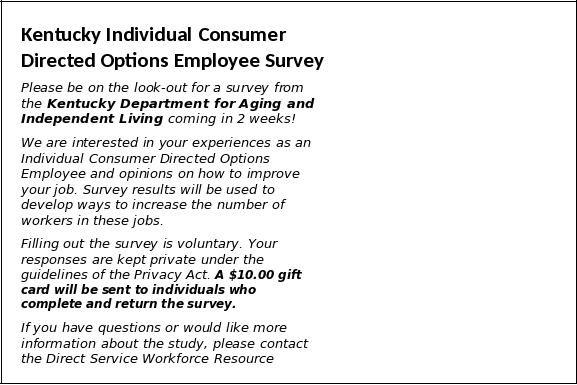



Kentucky
Department for Aging and Independent Living
275
East Main Street, 3E-E
Frankfort
KY 40621
Recipient
Name Street
Address City,
State, Zip Code
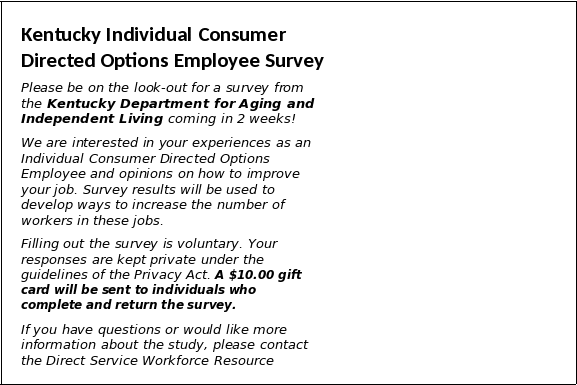

<<Greeting Line>>
As part of a federal grant, the Kentucky Department for Aging and Independent Living is in the process of collecting information on behalf of the Centers for Medicare and Medicaid Services. This information relates to experiences of Individual Community Directed Options Employees who are working or have worked, in the past 12 months, to support a person who is older or who has a disability. You are being asked to complete this survey because your support/care enables or has enabled the person to live in his/her own home through the Community Directed Options (CDO) program. This is an opportunity for you to voice your opinions. The survey is voluntary and will not affect your status as a provider. Your information will be kept private under the guidelines of the Privacy Act.
We are very interested in obtaining your feedback about your experiences as an Individual Community Directed Options Employee and your opinions about possible ways to improve your job. The Kentucky Department of Aging and Independent Living will use information from this survey to develop ways to attract more workers into these jobs and keep workers in these jobs longer.
You can be assured that the information you give us on the survey will be kept private. Results will only be reported in summary form and you will not be identified. If you have questions while completing the survey or would like more information about the study, please contact the Direct Service Workforce Resource Center toll-free at 1-877-822-2647.
This survey should take only 10-15 minutes to complete. The Centers for Medicare and Medicaid Services has authorized respondents to receive a $10.00 gift card by mail after your completed survey is received.
We greatly appreciate your time and will use your feedback to identify ways to improve the experiences of the direct service workforce. Thank you in advance for completing this survey!
Sincerely,
<<Recipient Name>>
<<Current Title>>
Enclosure
Survey Instructions
Purpose of the Survey:
You are being asked to complete this survey because you are working or have worked, in the past 12 months, to support a person who is older or who has a disability. Your support/care enables the person to live in his/her own home through the Consumer Directed Options (CDO) program. A growing number of older people and people with disabilities in the U.S. need personal support or assistance in their own homes. However, there are not enough workers who provide this type of service. Seven states are participating in this survey project, sponsored by the Centers for Medicare and Medicaid Services. Information from this survey will help the state develop ways to attract more workers into these jobs and keep workers in these jobs longer.
Directions:
Please complete the survey and return in the self-addressed stamped envelope provided. Or if you have access to the Internet, you may fill out the survey through a secure website at: https://www.research.net/s/Kentucky-CDO-Employee-Survey .
If you fill out the survey online, please enter <<123456>> when it asks for your Survey ID number. The survey will take approximately 10-15 minutes to complete.
Once you complete and return your survey you will receive a $10 gift card by mail.
Filling out this survey is voluntary. Your responses will be kept private under the guidelines of the Privacy Act. Your responses will not affect your status as a CDO provider in Kentucky or the services the person(s) you support receives. This survey has been assigned Survey ID number that appears at the bottom of every page. This number will be linked to your name and contact information only so that we can send you a $10 gift card when you return the completed survey. Your name and all other identifying information will be kept separate from your survey responses.
For More Information:
If you have questions about the purpose of the survey or how to respond, please contact the Direct Service Workforce Resource Center toll-free at 1-877-822-2647.
Survey Questions
In the questions below, a “CDO employee” is a person, like you, who is employed directly by a person who is older or has disabilities. You are employed by this person to provide paid services, care, and supports in his or her own home.
Do you currently work as a CDO employee?
Yes, I have worked as a CDO employee in the last 30 days. PLEASE CONTINUE AND COMPLETE THE REST OF THE SURVEY.
No, I have not worked as a CDO employee in the last 30 days. PLEASE STOP HERE AND RETURN THE SURVEY FOR YOUR GIFT CARD.
How long have you worked as a CDO employee? Count your time at all jobs you have had doing this work. (provide number of full years and months)
______Years _____ Months
Do you work as a CDO employee for a… (check all that apply)
Family member
Friend, neighbor, or someone else who you know
Someone you didn’t know before
What is the reason(s) the person(s) you work for needs assistance? (check all that apply)
Physical disability
Intellectual or developmental disability
Older people with a need for support, assistance, or supervision due to chronic illness or disability, people with cognitive impairment
Mental health, addiction, or behavioral health
Traumatic brain injury
I don’t know
Other (specify)
Why did you decide to start providing services and supports as a CDO employee? (check all that apply)
A friend or family member needed care
It gives me personal satisfaction
I can work a flexible schedule
This is the only job I can find
It is a good entry level job compared to other health care or human service related jobs
I need the income this job provides
Other___________________________
How many hours were you paid to work as a CDO employee
during the last week?
0 hours
1-8 hours
9-16 hours
17-24 hours
25-31 hours
32-40 hours
More than 40 hours
How many people did you work for as a CDO employee during the last week? This information is needed to better understand the size of this workforce in the state.
Zero
One
Two
Three to five
More than five
How likely is it that you will still be working as a CDO employee—either for the person(s) you currently support or for someone else—a year from now? Your response will not affect your status as a CDO employee in Kentucky or the services the person(s) you support receives.
Very likely
Somewhat likely
Not likely at all
Don’t know
Do you receive any of the following benefits as a part of your job as a CDO employee? (check “yes”, “no”, or “I don’t know” for each type of benefit)
Health insurance
Yes
No
Idon’t know
Paid vacation time
Yes
No
I don’t know
Paid sick leave time
Yes
No
I don’t know
Paid time off (PTO) (paid days off that can be used for either vacation or sick leave)
Yes
No
I don’t know
Transportation reimbursement
Yes
No
I don’t know
Workers’ compensation
Yes
No
I don’t know
Unemployment benefits
Yes
No
I don’t know
 Other,
please specify
Other,
please specify Who pays for your bills when you go to a doctor or hospital? (check all that apply)
My health insurance (includes Medicare or Medicaid) pays some or all
My spouse or family member’s insurance pays some or all
I pay some or all myself or someone else pays some or all for me (I do not have health insurance)
I don’t go to the doctor
I don’t know
Other (please describe)
If you support more than one person, please answer Questions 10 – 16 about the one person who you have worked the highest number of hours for as a CDO employee in the last 30 days.
How many hours did you work for this one person in the last week?
0 hours
1-8 hours
9-16 hours
17-24 hours
25-31 hours
32-40 hours
More than 40 hours
How long have you worked for this one person?
Less than 1 month
1-6 months
6 months—1 year
1-2 years
2-3 years
3-5 years
Over 5 years
What is the highest amount per hour that you are paid to work for this person?
$____.____ per hour
Additional Comments: _____
What is the lowest amount per hour that you are paid to work for this person?
$____.____ per hour
Additional Comments: _____
How old is this person? Your response is important to understanding the number of workers available to support people served by different state programs.
Birth to 17 years
18 to 21 years
22 to 64
65 or older
What type of services do you provide to this person? (check all that apply)
Assistance with activities of daily living such as bathing, dressing, feeding, transferring, and mobility
Assistance with instrumental activities of daily living such as cleaning, housekeeping, preparing meals, shopping, and managing money
Assistance with communication and self-direction (for example, providing training on communication skills, coaching and advocacy to support self-direction)
Assistance in the work place, or assistance with vocational, or educational activities
Assistance with social and recreational activities and community involvement
Assistance with social, emotional, or behavioral needs (for example, providing coaching on building relationships and friendships, implementing a behavior management program)
Assistance with medication or health care
Assistance with transportation
Do you live with this person? Your response will help with planning to recruit more CDO employees.
Yes
No
About You
What is your gender?
Male
Female
What is your age?
_____ (years)
What is the highest education level you have completed? (check only one)
Grades 1-8
Some high school (grades 9-12)
High school diploma/GED
Vocational diploma/certificate (e.g., CNA certificate)
Some college
Associate’s degree
Bachelor’s degree
Master’s degree
Other
Thank you for completing this survey.
For paper surveys:
Please return your completed survey to Individual CDO Employee Survey, c/o Department for Aging and Independent Living, 275 East Main Street, 3E-E, Frankfort KY 40621 in the postage paid envelope provided.
PRA Disclosure Statement
According to the Paperwork Reduction Act of 1995, no persons are required to respond to a collection of information unless it displays a valid OMB control number. The valid OMB control number for this information collection is 0938-NEW. The time required to complete this information collection is estimated to average 20 min per response, including the time to review instructions, search existing data resources, gather the data needed, and complete and review the information collection. If you have comments concerning the accuracy of the time estimate(s) or suggestions for improving this form, please write to: CMS, 7500 Security Boulevard, Attn: PRA Reports Clearance Officer, Mail Stop C4-26-05, Baltimore, Maryland 21244-1850.
Survey #4: Maine Independent Provider Survey Materials
Maine Personal Attendant Survey




Maine Department of Health and
Human Services
221 State Street
Augusta, ME 04333
Recipient
Name Street
Address City,
State, Zip Code
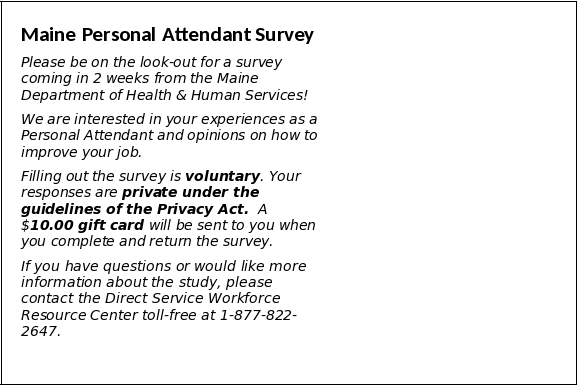



Maine Department of Health and
Human Services
221 State Street
Augusta, ME 04333
Recipient
Name Street
Address City,
State, Zip Code
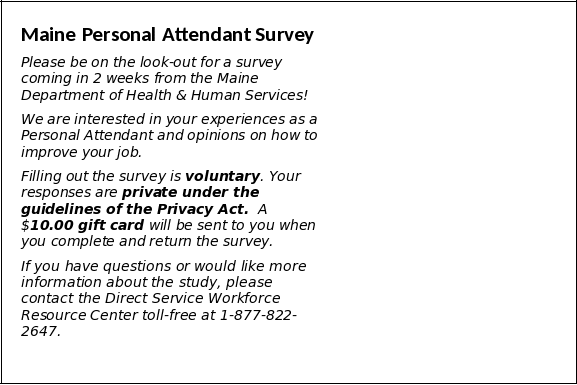

Maine Department of Health and Human Services
221 State Street
Augusta, ME 04333
<<First Name>> <<Last Name>>
<<Recipient Title>>
<<Recipient Street Address>>
<<Recipient City>>, <<Recipient State>> <<Recipient Zip>>
<<Greeting Line>>
The Maine Department of Health and Human Services is in the process of collecting information about the experiences of Personal Attendants who are working, or have worked in the past 12 months, to support a person who is older or who has a disability. This survey is sponsored by the Centers for Medicare and Medicaid Services.
You are being asked to complete this survey because your support has helped the person to live in his/her own home. We are very interested in knowing more about the kind of work you do and your thoughts. The survey is voluntary and will not affect your status as a provider.
The information you give us on the survey will be kept private under the guidelines of the Privacy Act. Results of the survey will only be reported in summary form and you will not be identified. This survey should take only 10-15 minutes to complete. A $10.00 gift card will be sent to individuals who complete and return the survey.
If you have questions while completing the survey or would like more information about the study, please contact the Direct Service Workforce Resource Center toll-free at 1-877-822-2647.
We appreciate your time and will use your feedback to identify ways to improve the experiences of Personal Attendants in Maine and other states. Thank you in advance for completing this survey!
Sincerely,
<<To be Determined>>
<<Current Title>>
Enclosure
Survey Instructions
Purpose of the Survey:
You are being asked to complete this survey because you are working or have worked, in the past 12 months, to support a person who is older or who has a disability. Your support/care enables the person to live in his/her own home. A growing number of older people and people with disabilities in the U.S. need personal support or assistance in their own homes. However, there are not enough workers who provide this type of service. Seven states are participating in this survey project, sponsored by the Centers for Medicare and Medicaid Services.
Directions:
Please complete the survey and return in the self-addressed stamped envelope provided. Or if you have access to the Internet, you may fill out the survey through a secure website at: https://www.research.net/s/Maine-Personal-Attendant.
If you complete the survey using the Internet, please enter <<123456>> when it asks for your Survey ID number. The survey will take approximately 10-15 minutes to complete.
Once you complete and return your survey, you will receive a $10 gift card by mail.
Filling out this survey is voluntary. Your responses will be kept private under the guidelines of the Privacy Act. Your responses will not affect your status as a Personal Attendant in Maine or the services the person(s) you support receives. This survey has been assigned Survey ID number that appears at the bottom of every page. This number will be linked to your name and contact information only so that we can send you a $10 gift card when you return the completed survey. Your name and all other identifying information will be kept separate from your survey responses.
For More Information:
If you have questions about the purpose of the survey or how to respond, please contact the Direct Service Workforce Resource Center at 1-877-822-2647.
Survey Questions
In the questions below, a “Personal Attendant” is a person, like you, who is employed directly by a person who is older or has disabilities and who is paid by your employer through Alpha One or Public Partnerships (PPL). You are employed by this person to provide paid services, care, and supports in his or her own home.
Do you currently work as a Personal Attendant?
Yes, I have worked as a Personal Attendant in the last 30 days. PLEASE CONTINUE AND COMPLETE THE REST OF THE SURVEY.
No, I have not worked as a Personal Attendant in the last 30 days. PLEASE STOP HERE AND RETURN THE SURVEY FOR YOUR GIFT CARD.
How long have you worked as a Personal Attendant for any employer? Count your time at all jobs you have had doing this work. (provide number of full years and months)
______Years _____ Months
Do you work as a Personal Attendant for a… (check all that apply)
Family member
Friend, neighbor, or someone else who you know
Someone you didn’t know before
What is the reason(s) the person(s) you work for needs assistance? (check all that apply)
Physical disability
Intellectual or developmental disability
Older people with a need for support, assistance, or supervision due to chronic illness or disability, people with cognitive impairment
Mental health, addiction, or behavioral health
Traumatic brain injury
Other (specify)
I don’t know
Why did you decide to start providing services and supports as a Personal Attendant? (check all that apply)
A friend or family member needed care
It gives me personal satisfaction
I can work a flexible schedule
This is the only job I can find
It is a good entry level job compared to other health care or human service related jobs
I need the income this job provides
Other___________________________
How many hours were you paid to work as a Personal Attendant
during the last week?
0 hours
1-8 hours
9-16 hours
17-24 hours
25-31 hours
32-40 hours
More than 40 hours
How many people did you work for as a Personal Attendant during the last week? This information is needed to better understand the size of this workforce in the state.
Zero
One
Two
Three to five
More than five
Think about your current job as a Personal Attendant. For each statement below, please indicate whether you: Strongly Disagree (1), Disagree (2), Neither Agree Nor Disagree (3), Agree (4), or Strongly Agree (5) by CIRCLING the appropriate number.
(choose one response per question)
-
Strongly Disagree
Disagree
Neither Agree nor Disagree
Agree
Strongly Agree
My job uses my skills well.
1
2
3
4
5
I am satisfied with my job.
1
2
3
4
5
I am satisfied with my wages.
1
2
3
4
5
I am satisfied with the number of hours I work.
1
2
3
4
5
How likely is it that you will still be working as a Personal Attendant—either for the person(s) you currently support or for someone else—a year from now? Your response will not affect your status as an independent provider in Maine or the services the person(s) you support receives.
Very likely
Somewhat likely
Not likely at all
Don’t know
For each topic listed below, please check the boxes if you have received training on the topic in a class or training program (check all that apply).
-
Yes, I have received training program on this topic in a class or training program.
Advocacy

Assessing needs of person receiving support

Behavior management

Building and maintaining friendships and relationships

Communication

Confidentiality of person receiving support

Conflict resolution

Empowerment of person receiving support

Rights of person receiving support

Crisis prevention and intervention

Cultural competence1

Direct service professionalism

Documentation

Ethics

Facilitation of services (e.g., finding and getting services for the individual)

Health and wellness

Household management

Infection control

Interpersonal relationship skills

Nutritional support

Organizational participation

Participant-directed service planning and implementation

Personal care

Problem solving

Providing services based on needs of individual

Safety and emergency training

Stress management/personal safety and wellness

Teamwork

Vocational, educational, and career support

For each topic listed below, please check the boxes if you have received training on the topic from the person you support or their family (check all that apply).
-
Yes, I have received training on this topic from the person I support or their family.
Advocacy

Assessing needs of person receiving support

Behavior management

Building and maintaining friendships and relationships

Communication

Confidentiality of person receiving support

Conflict resolution

Empowerment of person receiving support

Rights of person receiving support

Crisis prevention and intervention

Cultural competence1

Direct service professionalism

Documentation

Ethics

Facilitation of services (e.g., finding and getting services for the individual)

Health and wellness

Household management

Infection control

Interpersonal relationship skills

Nutritional support

Organizational participation

Participant-directed service planning and implementation

Personal care

Problem solving

Providing services based on needs of individual

Safety and emergency training

Stress management/personal safety and wellness

Teamwork

Vocational, educational, and career support

For each topic listed below, please check the boxes if you need training on the topic (check all that apply).
-
Yes, I need training on this topic.
Advocacy

Assessing needs of person receiving support

Behavior management

Building and maintaining friendships and relationships

Communication

Confidentiality of person receiving support

Conflict resolution

Empowerment of person receiving support

Rights of person receiving support

Crisis prevention and intervention

Cultural competence1

Direct service professionalism

Documentation

Ethics

Facilitation of services (e.g., finding and getting services for the individual)

Health and wellness

Household management

Infection control

Interpersonal relationship skills

Nutritional support

Organizational participation

Participant-directed service planning and implementation

Personal care

Problem solving

Providing services based on needs of individual

Safety and emergency training

Stress management/personal safety and wellness

Teamwork

Vocational, educational, and career support

For each topic listed below, please check the boxes if you think training should be required for attendant care providers/PAs on this topic (check all that apply).
-
Yes, I think training should be required for attendant care providers/PAs on this topic.
Advocacy

Assessing needs of person receiving support

Behavior management

Building and maintaining friendships and relationships

Communication

Confidentiality of person receiving support

Conflict resolution

Empowerment of person receiving support

Rights of person receiving support

Crisis prevention and intervention

Cultural competence1

Direct service professionalism

Documentation

Ethics

Facilitation of services (e.g., finding and getting services for the individual)

Health and wellness

Household management

Infection control

Interpersonal relationship skills

Nutritional support

Organizational participation

Participant-directed service planning and implementation

Personal care

Problem solving

Providing services based on needs of individual

Safety and emergency training

Stress management/personal safety and wellness

Teamwork

Vocational, educational, and career support

Do you receive any of the following benefits as a part of your job as a Personal Attendant? (check yes, no, or I don’t know for each type of benefit)
Health insurance
Yes
No
Idon’t know
Paid vacation time
Yes
No
I don’t know
Paid sick leave time
Yes
No
I don’t know
Paid time off (PTO) (paid days off that can be used for either vacation or sick leave)
Yes
No
I don’t know
Transportation reimbursement
Yes
No
I don’t know
Workers’ compensation
Yes
No
I don’t know
Unemployment benefits
Yes
No
I don’t know
 Other,
please specify
Other,
please specify
Who pays for your bills when you go to a doctor or hospital? (check all that apply)
My health insurance (includes Medicare or MaineCare) pays some or all
My spouse or family member’s insurance pays some or all
I pay some or all myself or someone else pays some or all for me (I do not have health insurance)
Other (please describe)
I don’t go to the doctor
I don’t know
If you do not have health insurance through your job as an attendant care provider or personal assistant, where do you get it from? (check all that apply)
I do not have health insurance
Another job
Spouse or partner
MaineCare
Medicare
Private plan/I buy my own health insurance
Pension/Retirement plan
Other (please describe)
Is getting to or from work difficult for you?
Always
Sometimes
Rarely or never
No, I live with the person I support
If you support more than one person, please answer Questions 18 – 23 about the one person who you have worked the highest number of hours for as a Personal Attendant in the last 30 days.
How many hours did you work for this one person in the last week?
0 hours
1-8 hours
9-16 hours
17-24 hours
25-31 hours
32-40 hours
More than 40 hours
How long have you worked for this one person?
Less than 1 month
1-6 month
6 months—1 year
1-2 years
2-3 years
3-5 years
Over 5 years
How much are you paid per hour to work for this person?
$____.____ per hour
Additional Comments: __________
How old is this person? Your response is important to understanding the number of workers available to support people served by different state programs.
Birth to 17 years
18 to 21 years
22 to 64
65 or older
What type of services do you provide to this person? (check all that apply)
Assistance with activities of daily living such as bathing, dressing, feeding, transferring, and mobility
Assistance with instrumental activities of daily living such as cleaning, housekeeping, preparing meals, shopping, and managing money
Assistance with medication or health care
Assistance with transportation
Do you live with this person? Your response will help with planning to recruit more Personal Attendants.
Yes
No
About You
What is your gender?
Male
Female
Which best describes your ethnicity?
Hispanic or Latino
Not Hispanic or Latino
Which best describes your race? (select one or more)
White
Black or African-American
American Indian or Alaskan Native
Asian
Native Hawaiian or other Pacific Islander
What is your age?
_____ (years)
What is the highest education level you have completed? (check only one)
Grades 1-8
Some high school (grades 9-12)
High school diploma/GED
Vocational diploma/certificate (e.g., CNA certificate)
Some college
Associate’s degree
Bachelor’s degree
Master’s degree
Other
What is your annual household income? “Household” includes yourself and everyone who lives with you.
Less than $22,000
$22,001 – $30,000
$30,001 – $40,000
$40,001 – $50,000
Over $50,001
Thank you for completing this survey.
For paper surveys: Please return it to Survey Research Center, University of Southern Maine, 15 Baxter Boulevard, Portland, Maine 04104 in the postage paid envelope provided.
PRA Disclosure Statement
According to the Paperwork Reduction Act of 1995, no persons are required to respond to a collection of information unless it displays a valid OMB control number. The valid OMB control number for this information collection is 0938-NEW. The time required to complete this information collection is estimated to average 20 min per response, including the time to review instructions, search existing data resources, gather the data needed, and complete and review the information collection. If you have comments concerning the accuracy of the time estimate(s) or suggestions for improving this form, please write to: CMS, 7500 Security Boulevard, Attn: PRA Reports Clearance Officer, Mail Stop C4-26-05, Baltimore, Maryland 21244-1850.
Survey #5: Minnesota Independent Provider Survey Materials
Minnesota Independent Provider Survey





Minnesota Department of Human
Services PO
Box 64976 St.
Paul, MN 55164-0976
Recipient
Name Street
Address City,
State, Zip Code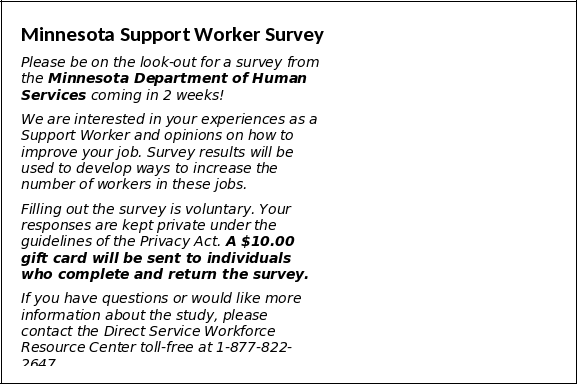



Recipient
Name Street
Address City,
State, Zip Code
Minnesota Department of Human
Services PO
Box 64976 St.
Paul, MN 55164-0976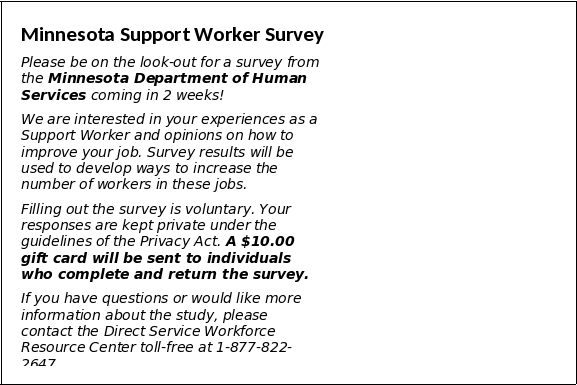

Minnesota Department of Human Services
PO Box 64976
St. Paul, MN 55164-0976
<<First Name>> <<Last Name>>
<<Recipient Title>>
<<Recipient Street Address>>
<<Recipient City>>, <<Recipient State>> <<Recipient Zip>>
<<Greeting Line>>
The Minnesota Department of Human Services is in the process of collecting information on the experiences of Support Workers who are working or have worked, in the past 12 months, to support a person who is older or who has a disability. This effort is sponsored by the Centers for Medicare and Medicaid Services. You are being asked to complete this survey because your support/care enables or has enabled the person to live in his/her own home through Minnesota’s Consumer Directed Community Supports program. This is an opportunity for you to voice your opinions. The survey is voluntary and will not affect your status as a provider. Your information will be kept private under the guidelines of the Privacy Act.
We are very interested in obtaining your feedback about your experiences as a Support Worker and your opinions about possible ways to improve your job. The Minnesota Department of Human Services will use information from this survey to develop ways to attract more workers into these jobs and keep workers in these jobs longer.
You can be assured that the information you give us on the survey will be kept private. Results will only be reported in summary form and you will not be identified. If you have questions while completing the survey or would like more information about the study, please contact the Direct Service Workforce Resource Center toll-free at 1-877-822-2647.
This survey should take only 10-15 minutes to complete. A $10.00 gift card will be sent to individuals who complete and return the survey.
We appreciate your time and will use your feedback to identify ways to improve the experiences of the direct service workforce. Thank you in advance for completing this survey!
Sincerely,
<<Sender Name>>
<<Current Title>>
Enclosure
Survey Instructions
Purpose of the Survey:
You are being asked to complete this survey because you are working, or have worked in the past 12 months, to support a person who is older or who has a disability. Your support/care enables the person to live in his/her own home through Minnesota’s Consumer Directed Community Supports program. A growing number of older people and people with disabilities in the U.S. need personal support or assistance in their own homes. However, there are not enough workers who provide this type of service. Seven states are participating in this survey project, sponsored by the Centers for Medicare and Medicaid Services. Information from this survey will help the state develop ways to attract more workers into these jobs and keep workers in these jobs longer.
Directions:
Please complete the survey and return in the self-addressed stamped envelope provided. Or if you have access to the Internet, you may fill out the survey through a secure website at:
https://www.research.net/s/Minnesota-Independent-Provider-Survey
If you fill out your survey using the Internet, please enter 123456 when it asks for your Survey ID number. The survey will take approximately 10-15 minutes to complete.
Once you complete and return your survey you will receive a $10 gift card by mail.
Filling out this survey is voluntary. Your responses will be kept private under the guidelines of the Privacy Act. Your responses will not affect your status as a support worker in Minnesota or the services the person(s) you support receives. This survey has been assigned Survey ID number that appears at the bottom of each page. This number will be linked to your name and contact information only so that we can send you a $10 gift card when you return the completed survey. Your name and all other identifying information will be kept separate from your survey responses.
For More Information:
If you have questions about the purpose of the survey or how to respond, please contact the Direct Service Workforce Resource Center at 1-877-822-2647.
Survey Questions
In the questions below, a “Support Worker” is a person, like you, who is employed directly by a person who is older or has disabilities. You are employed by this person to provide paid services, care, and supports in his or her own home.
Do you currently work as a Support Worker?
Yes, I have worked as a Support Worker in the last 30 days. PLEASE CONTINUE AND COMPLETE THE REST OF THE SURVEY.
No, I have not worked as a Support Worker in the last 30 days. PLEASE STOP HERE AND RETURN THE SURVEY FOR YOUR GIFT CARD.
How long have you worked as an Support Worker? Count your time at all jobs you have had doing this work. (provide number of full years and months)
______Years _____ Months
Do you work as a Support Worker for a… (check all that apply)
Family member
Friend, neighbor, or someone else who you know
Someone you didn’t know before
What is the reason(s) the person(s) you work for needs assistance? (check all that apply)
Physical disability
Intellectual or developmental disability
Older people with a need for support, assistance, or supervision due to chronic illness or disability, people with cognitive impairment
Mental health, addiction, or behavioral health
Traumatic brain injury
Other (specify)
I don’t know
Why did you decide to start providing services and supports as a Support Worker? (check all that apply)
A friend or family member needed care
It gives me personal satisfaction
I can work a flexible schedule
This is the only job I can find
It is a good entry level job compared to other health care or human service related jobs
I need the income this job provides
Other___________________________
How many hours were you paid to work as a Support Worker during the last week?
0 hours
1-8 hours
9-16 hours
17-24 hours
25-31 hours
32-40 hours
More than 40 hours
How many people did you work for as a Support Worker during the last week? This information is needed to better understand the size of this workforce in the state.
Zero
One
Two
Three to five
More than five
Think about your current job as a Support Worker. For each statement below, please indicate whether you: Strongly Disagree (1), Disagree (2), Neither Agree Nor Disagree (3), Agree (4), or Strongly Agree (5) by CIRCLING the appropriate number.
(choose one response per question)
-
Strongly Disagree
Disagree
Neither Agree nor Disagree
Agree
Strongly Agree
My job uses my skills well.
1
2
3
4
5
I am satisfied with my job.
1
2
3
4
5
I am satisfied with my wages.
1
2
3
4
5
I am satisfied with the number of hours I work.
1
2
3
4
5
How likely is it that you will still be working as a Support Worker—either for the person(s) you currently support or for someone else—a year from now? Your response will not affect your status as a Support worker in Minnesota or the services the person(s) you support receives.
Very likely
Somewhat likely
Not likely at all
Don’t know
For each topic listed below, please check the boxes if you have received training on the topic in a class or training program (check all that apply).
-
Yes, I have received training program on this topic in a class or training program.
Advocacy

Assessing needs of person receiving support

Behavior management

Building and maintaining friendships and relationships

Communication

Confidentiality of person receiving support

Conflict resolution

Empowerment of person receiving support

Rights of person receiving support

Crisis prevention and intervention

Cultural competence1

Direct service professionalism

Documentation

Ethics

Facilitation of services (e.g., finding and getting services for the individual)

Health and wellness

Household management

Infection control

Interpersonal relationship skills

Nutritional support

Organizational participation

Participant-directed service planning and implementation

Personal care

Problem solving

Providing services based on needs of individual

Safety and emergency training

Stress management/personal safety and wellness

Teamwork

Vocational, educational, and career support

For each topic listed below, please check the boxes if you have received training on the topic from the person you support or their family (check all that apply).
-
Yes, I have received training on this topic from the person I support or their family.
Advocacy

Assessing needs of person receiving support

Behavior management

Building and maintaining friendships and relationships

Communication

Confidentiality of person receiving support

Conflict resolution

Empowerment of person receiving support

Rights of person receiving support

Crisis prevention and intervention

Cultural competence1

Direct service professionalism

Documentation

Ethics

Facilitation of services (e.g., finding and getting services for the individual)

Health and wellness

Household management

Infection control

Interpersonal relationship skills

Nutritional support

Organizational participation

Participant-directed service planning and implementation

Personal care

Problem solving

Providing services based on needs of individual

Safety and emergency training

Stress management/personal safety and wellness

Teamwork

Vocational, educational, and career support

For each topic listed below, please check the boxes if you need training on the topic (check all that apply).
-
Yes, I need training on this topic.
Advocacy

Assessing needs of person receiving support

Behavior management

Building and maintaining friendships and relationships

Communication

Confidentiality of person receiving support

Conflict resolution

Empowerment of person receiving support

Rights of person receiving support

Crisis prevention and intervention

Cultural competence1

Direct service professionalism

Documentation

Ethics

Facilitation of services (e.g., finding and getting services for the individual)

Health and wellness

Household management

Infection control

Interpersonal relationship skills

Nutritional support

Organizational participation

Participant-directed service planning and implementation

Personal care

Problem solving

Providing services based on needs of individual

Safety and emergency training

Stress management/personal safety and wellness

Teamwork

Vocational, educational, and career support

For each topic listed below, please check the boxes if you think training should be required for attendant care providers/PAs on this topic (check all that apply).
-
Yes, I think training should be required for Support Workers on this topic.
Advocacy

Assessing needs of person receiving support

Behavior management

Building and maintaining friendships and relationships

Communication

Confidentiality of person receiving support

Conflict resolution

Empowerment of person receiving support

Rights of person receiving support

Crisis prevention and intervention

Cultural competence1

Direct service professionalism

Documentation

Ethics

Facilitation of services (e.g., finding and getting services for the individual)

Health and wellness

Household management

Infection control

Interpersonal relationship skills

Nutritional support

Organizational participation

Participant-directed service planning and implementation

Personal care

Problem solving

Providing services based on needs of individual

Safety and emergency training

Stress management/personal safety and wellness

Teamwork

Vocational, educational, and career support

Do you receive any of the following benefits as a part of your job as a Support Worker? (check yes, no, or I don’t know for each type of benefit)
Health insurance
Yes
No
Idon’t know
Paid vacation time
Yes
No
I don’t know
Paid sick leave time
Yes
No
I don’t know
Paid time off (PTO) (paid days off that can be used for either vacation or sick leave)
Yes
No
I don’t know
Transportation reimbursement
Yes
No
I don’t know
Workers’ compensation
Yes
No
I don’t know
Unemployment benefits
Yes
No
I don’t know
 Other,
please specify
Other,
please specify Who pays for your bills when you go to a doctor or hospital? (check all that apply)
My health insurance (includes Medicare, Medical Assistance, Minnesota Care, Minnesota Senior Health Options) pays some or all
My spouse or family member’s insurance pays some or all
I pay some or all myself or someone else pays some or all for me
(I do not have health insurance)Other (please describe)
I don’t go to the doctor
I don’t know
If you do not have health insurance through your job as a Support Worker, where do you get it from? (check all that apply)
I do not have health insurance
Another job
Spouse or partner
Medicaid, Medical Assistance
Medicare
Private plan/I buy my own health insurance
Pension/Retirement plan
Other (please describe)
Is getting to or from work difficult for you?
Always
Sometimes
Rarely or never
No, I live with the person I support
If you support more than one person, please answer Questions 17-22 about the one person who you have worked the highest number of hours for as a Support Worker in the last 30 days.
How many hours did you work for this one person in the last week?
0 hours
1-8 hours
9-16 hours
17-24 hours
25-31 hours
32-40 hours
More than 40 hours
How long have you worked for this one person
Less than 1 month
1-6 month
6 months—1 year
1-2 years
2-3 years
3-5 years
Over 5 years
How much are you paid per hour to work for this person?
$____.____ per hour
Additional Comment: _____________
How old is this person? Your response is important to understanding the number of workers available to support people served by different state programs.
Birth to 17 years
18 to 21 years
22 to 64
65 or older
What type of services do you provide to this person? (check all that apply)
Assistance with activities of daily living such as bathing, dressing, feeding, transferring, and mobility
Assistance with instrumental activities of daily living such as cleaning, housekeeping, preparing meals, shopping, and managing money
Assistance with communication and self-direction (for example, providing training on communication skills, coaching and advocacy to support self-direction)
Assistance in the work place, or assistance with vocational, or educational activities
Assistance with social and recreational activities and community involvement
Assistance with social, emotional, or behavioral needs (for example, providing coaching on building relationships and friendships, implementing a behavior management program)
Assistance with medication or health care
Assistance with transportation
Do you live with this person? Your response will help with planning to recruit more Support Workers.
Yes
No
About You
What is your gender?
Male
Female
Which best describes your ethnicity?
Hispanic or Latino
Not Hispanic or Latino
Which best describes your race? (select one or more)
White
Black or African-American
American Indian or Alaskan Native
Asian
Native Hawaiian or other Pacific Islander
What is your age?
_____ (years)
What is the highest education level you have completed? (check only one)
Grades 1-8
Some high school (grades 9-12)
High school diploma/GED
Vocational diploma/certificate (e.g., CNA certificate)
Some college
Associate’s degree
Bachelor’s degree
Master’s degree
Other
What is your annual household income? “Household” includes yourself and everyone who lives with you.
Less than $22,000
$22,001 – $30,000
$30,001 – $40,000
$40,001 – $50,000
Over $50,001
Thank you for completing this survey.
For paper surveys:
Please return your completed survey to Kari Benson, P.O. Box 64976, St. Paul, Minnesota 55164-0976 in the postage paid envelope provided.
PRA Disclosure Statement
According to the Paperwork Reduction Act of 1995, no persons are required to respond to a collection of information unless it displays a valid OMB control number. The valid OMB control number for this information collection is 0938-NEW. The time required to complete this information collection is estimated to average 20 min per response, including the time to review instructions, search existing data resources, gather the data needed, and complete and review the information collection. If you have comments concerning the accuracy of the time estimate(s) or suggestions for improving this form, please write to: CMS, 7500 Security Boulevard, Attn: PRA Reports Clearance Officer, Mail Stop C4-26-05, Baltimore, Maryland 21244-1850.
1 Cultural competence is a set of behaviors, attitudes, and policies that come together in a system, agency or among professionals and enable them to work effectively in cross-cultural situations.
1 Cultural competence is a set of behaviors, attitudes, and policies that come together in a system, agency or among professionals and enable them to work effectively in cross-cultural situations.
1 Cultural competence is a set of behaviors, attitudes, and policies that come together in a system, agency or among professionals and enable them to work effectively in cross-cultural situations.
1 Cultural competence is a set of behaviors, attitudes, and policies that come together in a system, agency or among professionals and enable them to work effectively in cross-cultural situations.
1 Cultural competence is a set of behaviors, attitudes, and policies that come together in a system, agency or among professionals and enable them to work effectively in cross-cultural situations.
1 Cultural competence is a set of behaviors, attitudes, and policies that come together in a system, agency or among professionals and enable them to work effectively in cross-cultural situations.
1 Cultural competence is a set of behaviors, attitudes, and policies that come together in a system, agency or among professionals and enable them to work effectively in cross-cultural situations.
1 Cultural competence is a set of behaviors, attitudes, and policies that come together in a system, agency or among professionals and enable them to work effectively in cross-cultural situations.
1 Cultural competence is a set of behaviors, attitudes, and policies that come together in a system, agency or among professionals and enable them to work effectively in cross-cultural situations.
1 Cultural competence is a set of behaviors, attitudes, and policies that come together in a system, agency or among professionals and enable them to work effectively in cross-cultural situations.
1 Cultural competence is a set of behaviors, attitudes, and policies that come together in a system, agency or among professionals and enable them to work effectively in cross-cultural situations.
1 Cultural competence is a set of behaviors, attitudes, and policies that come together in a system, agency or among professionals and enable them to work effectively in cross-cultural situations.
1 Cultural competence is a set of behaviors, attitudes, and policies that come together in a system, agency or among professionals and enable them to work effectively in cross-cultural situations.
1 Cultural competence is a set of behaviors, attitudes, and policies that come together in a system, agency or among professionals and enable them to work effectively in cross-cultural situations.
| File Type | application/msword |
| Author | Ashley Tomisek |
| Last Modified By | CTAC |
| File Modified | 2012-02-15 |
| File Created | 2012-02-15 |
© 2026 OMB.report | Privacy Policy